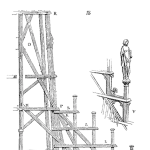
Hurricanes pose serious risks to physical assets in chemical plants and refineries. During hurricanes, plant equipment can be damaged by high winds and/or flood waters. I’m hoping your refinery has adequate protection against flooding…so let us see what risks are posed by high winds.
High winds acting on plant equipment exert a strong force on the equipment leading to toppling or sliding and sometime even lead to a complete structural failure. However, another major risk during hurricane is the flying debris that may hit the asset. During Ike my apartment was fine but the window in my living room was shattered by a flying debris carried by the wind – this is the reason we are recommended to duct tape our windows during hurricanes.
Similarly for plant equipment you may have debris that can potentially damage the asset and may also lead to loss of containment. Objects nearby the refinery that can be “blown” during wind constitute the debris – e.g. damaged buildings and utility lines, vegetation, drums, barrels.
If your refinery is operating in hurricane prone area, make sure your hurricane preparedness addresses debris:
- Minimize debris that can potentially damage equipment
- Remove of temporary buildings (trailers, mobile homes) from the refinery site and nearby area
- Secure drums/barrels that can potentially roll or fly
Leave a Reply